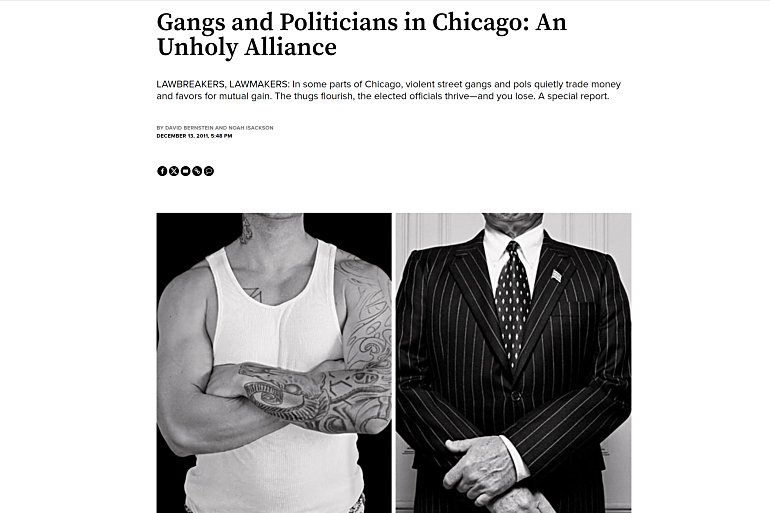Chicago (GSL) – Have you ever wondered why politicians running Illinois so seldom criticize criminal gangs for the gang violence that permeates big cities, but especially Chicago?
Have you ever wondered why these same politicians refer to this criminal violence as “gun violence” instead of more accurately describing it as gang violence?
That reason has to do with an unholy alliance between many Chicago politicians – both local and state elected officials – and Chicago’s notorious street gangs.
The gangs in Chicago provide votes, patronage armies and campaign “donations.” In return, the politicians deliver “violence prevention” funding, courtesy of the taxpayers, along with looking the other way on gang crime. Hence why these politicians refer to gang violence as “gun violence.”
Chicago Magazine reported on this unholy alliance in 2012. Here’s what they found:
…“Gangs and politics have always gone together in this city,” says John Hagedorn, a gang expert and professor of criminal justice at the University of Illinois at Chicago. It’s a shadowy alliance, he adds, that is deeply ingrained in Chicago’s political culture: “You take care of them; they’ll take care of us.”
To what extent do street gangs influence—and corrupt—Chicago politics today? And what are the consequences for ordinary citizens? To find out, Chicago conducted more than 100 interviews with current and former elected officials and candidates, gang leaders, senior police officials, rank-and-file cops, investigators, and prosecutors. We also talked to community activists, campaign operatives, and criminologists. We limited our scope to the city (though alliances certainly exist in some gang-infested suburbs) and focused exclusively on Democrats, since they are the dominant governing party in Chicago and in the statehouse. Moreover, we looked at the political influence of street gangs only, not of traditional organized crime—a worthy subject for another day.Our findings:
- While they typically deny it, many public officials—mostly, but not limited to, aldermen, state legislators, and elected judges—routinely seek political support from influential street gangs. Meetings like the ones Baskin organized, for instance, are hardly an anomaly. Gangs can provide a decisive advantage at election time by performing the kinds of chores patronage armies once did.
- In some cases, the partnerships extend beyond the elections in troubling—and possibly criminal—ways, greased by the steady and largely secret flow of money from gang leaders to certain politicians and vice versa. The gangs funnel their largess through opaque businesses, or front companies, and through under-the-table payments. In turn, grateful politicians use their payrolls or campaign funds to hire gang members, pull strings for them to get jobs or contracts, or offer other favors (see “Gangs and Politicians: Prisoner Shuffle”).
- Most alarming, both law enforcement and gang sources say, is that some politicians ignore the gangs’ criminal activities. Some go so far as to protect gangs from the police, tipping them off to impending raids or to surveillance activities—in effect, creating safe havens in their political districts. And often they chafe at backing tough measures to stem gang activities, advocating instead for superficial solutions that may garner good press but have little impact.
The paradox is that Chicago’s struggle to combat street gangs is being undermined by its own elected officials.
Over the 12 years since Chicago Magazine’s investigation became public, Illinois political leaders have vastly expanded “violence prevention” spending, at some points as much as nearly $300 million per year. A big part of this spending goes to various businesses, front companies and “non-profits” with ties to street gangs.
Included among this so-called violence prevention funding are “violence interrupters” paid $200 per day to “interrupt violence.” That’s $52,000 per year if they work 5-day work weeks for these “justice-impacted individuals” (Illinois’ new politically correct description of criminals/offenders/ex-cons) to pretend that they are stopping gang conflicts before they turn violent.
In reality, more than a few of them spend more time continuing their life of crime. Like the “peacekeeper” who participated in the carjacking and beating of an Asian motorist over a holiday weekend last year on his very first day on the streets as a so-called “peacekeeper.” Others have been arrested for everything from negligently shooting themselves with stolen guns to selling drugs and guns – while contracting as “Safe Passage” escorts for the Chicago Public Schools.

“What are you prepared to do?” – Ofc. James Malone – The Untouchables
ugotsta let dindus run free, yo!
Again, gun control has never been about the guns only the control.